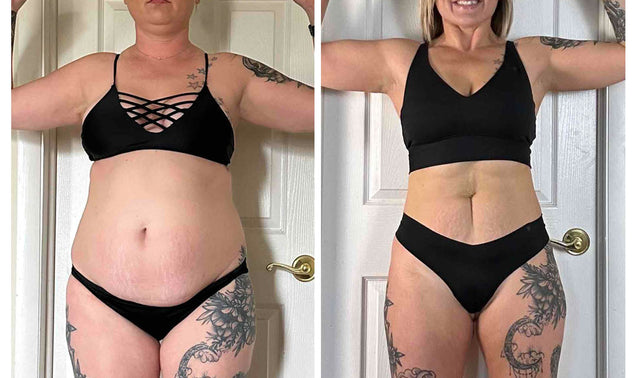When it comes to losing fat or building muscle, we prioritize our training and nutrition, but there’s a third pillar to body transformation success that’s not stressed enough -- sleep.
Simply put, if you’re not getting enough quality sleep each night, the results you can obtain from your diet and training program will be severely short-changed.
And it goes much deeper than being a bit cranky and not having the energy to give it your all in your daily workouts.
Sleep is the time when your body does the majority of its recovery and growth. With sufficient amounts of it, you’re performing mentally or physically at 100% during the day.
With that in mind, let’s look at the many ways sleep impacts fat loss and muscle building.
How Sleep Impacts Fat Loss & Muscle Building
Sleep Increases Muscle Building Hormones
During sleep our body is engulfed in a cascade of important muscle-building hormones, like testosterone, growth hormone, and insulin-like growth factor-1 (IGF)-1.
These hormones are absolutely essential for optimal repair, recovery and growth.[2,3,4]
Sleep deprivation blunts the release of these hormones in your body, ultimately undercutting your ability to recover and grow at an optimal rate.
Sleep Influences Appetite
Sleep even affects our appetite, more specifically the hormones that govern our hunger in ghrelin and leptin.
Ghrelin is the “hunger” hormone that increases appetite and tells our brain that it’s time to eat. Leptin is the hormone that tells the body it has had enough to eat.
Not getting enough quality sleep results in higher ghrelin levels the following day along with decreased leptin levels.[5,6]
Basically, this means you are much more likely to feel hungrier than usual during the day while also feeling less satiated from the foods you eat. This is the perfect combination for overeating and blowing your nutrition plan, which can stall fat loss.
Sleep Affects Workout Performance
To build muscle and strength, your muscle have to be forced to lift heavier weights and perform more reps than they previously have (otherwise known as “progressive overload”).
While nutrition plays a key part in our ability to perform at a high level in our workouts, so too does sleep.
Inadequate sleep stunts our recovery abilities, but beyond that it also reduces our strength and endurance in our workout the next day.[1] Furthermore, sleep deprivation also negatively affects focus during training, increasing the likelihood for half-hearted workouts as well as the risk of injury while training.
The Consequences of Poor Sleep
Elevated Cortisol
Cortisol is the body’s primary stress hormone, released in times when we encounter or perceive a threat. In addition to igniting the “fight or flight” response, cortisol also accelerates the breakdown of proteins into amino acids which are subsequently converted into glucose to provide energy for the body in these times of stress.
As you can see, prolonged elevation of cortisol is terrible for building muscle.
Research shows that sleep deprivation leads to significant increases in daytime cortisol levels.[7,8]
But this is just the beginning...
Decreased Testosterone & Growth Hormone
Sleep is when production of muscle-building hormones is maximized. In fact, up to 3/4 of daily human growth hormone release happens during the deepest sleep cycle.
However, when we are sleep deprived research notes that testosterone and growth hormone levels are significantly lower.
Not only does this limit your ability to recover from the previous days workout, it also hinders your ability to build muscle.
Insulin Resistance
Insulin is the body’s primary nutrient shuttling hormone that picks up glucose from the bloodstream and directs it into muscle cells and fat tissue. Individuals with good insulin sensitivity store more glucose in their muscle tissue and less in adipose tissue.
However, research has shown that just one night of poor sleep can induce insulin resistance in otherwise healthy subjects.[10]
When we are insulin resistant, nutrient partitioning is poor and we’re more likely to store the food we eat as fat as opposed to using to it build muscle.
Increased Risk of Injury & Illness
We alluded to this up top, but it bears repeating -- sleep deprivation reduces athletic performance and increases your risk of injury during training or competition.
The reasons for this are multifactorial, but essentially lack of sleep decreases mental alertness, cognition, and focus.
This inability to concentrate heightens the potential for things going “sideways” while training. Plus, inadequate sleep also lowers immune system function and increases inflammation, further impairing your body’s ability to recover while increasing the risk of illness.[11]
Increased Fat Gain
Above, we mentioned that sleep alters the balance of the body’s hunger and satiety hormones, ghrelin and leptin, respectively. Basically when we don’t get enough sleep we tend to crave higher calorie foods, are more likely to overeat, and end up hurting our fat loss diet.
But that’s not all.
If you remember, we also said that a lack of sleep stunts growth hormone release.
This is doubly bad as in addition to the impaired recovery that accompanies lower growth hormone levels, it also impacts our body’s ability to breakdown fat for energy.
And, when you factor in that poor sleep also raises cortisol levels, you’re faced with a double whammy of less fat breakdown combined with accelerated muscle breakdown -- something you never want when dieting for fat loss.
To top it off, research also finds a clear association between increased body fat, particularly in the abdominal region and a lack of sleep.[12]
Get Some Sleep!
All of this serves to underscore just how vitally important sleep is each and everyday not only to your body composition goals but also your overall health and wellness. Short-changing your sleep during the week and trying to catch up on it during the weekend isn’t really an effective strategy either as five days of the week your body is a hormonal catastrophe and that damage can’t be undone by only two days of decent sleep.
Due to the high level of importance sleep plays in achieving your performance and physique goals, 1UP Nutrition has created both a men’s sleep formula in Recharge PM Burner as well as women’s sleep formula in Beauty Dream PM Burner.
There’s no question how vital sleep is to your training and recovery. It’s absolutely essential.
1UP Nutrition has developed these nighttime sleep and recovery aids to help quiet an overactive mind and help you get the necessary 7-9 hours of sleep you need to repair and grow lean, toned muscle.
If you struggle to fall asleep at night or stay asleep, our line of nighttime recovery aids may be just the thing you need to hit the pillow and finally get a night of productive rest.
References
- Fullagar, H. H. K., Skorski, S., Duffield, R., Hammes, D., Coutts, A. J., & Meyer, T. (2015). Sleep and athletic performance: the effects of sleep loss on exercise performance, and physiological and cognitive responses to exercise. Sports Medicine (Auckland, N.Z.), 45(2), 161–186. https://doi.org/10.1007/s40279-014-0260-0
- Leproult R, Van Cauter E. Role of Sleep and Sleep Loss in Hormonal Release and Metabolism. Endocrine development. 2010;17:11-21. doi:10.1159/000262524.
- Sassin, J. F., Parker, D. C., Johnson, L. C., Rossman, L. G., Mace, J. W., & Gotlin, R. W. (1969). Effects of slow wave sleep deprivation on human growth hormone release in sleep: Preliminary study. Life Sciences, 8(23, Part 1), 1299–1307. https://doi.org/https://doi.org/10.1016/0024-3205(69)90034-4
- Tae Won Kim, Jong-Hyun Jeong, and Seung-Chul Hong, “The Impact of Sleep and Circadian Disturbance on Hormones and Metabolism,” International Journal of Endocrinology, vol. 2015, Article ID 591729, 9 pages, 2015. https://doi.org/10.1155/2015/591729.
- Taheri S, Lin L, Austin D, Young T, Mignot E. Short Sleep Duration Is Associated with Reduced Leptin, Elevated Ghrelin, and Increased Body Mass Index. Froguel P, ed. PLoS Medicine. 2004;1(3):e62. doi:10.1371/journal.pmed.0010062.
- Schmid, S. M., Hallschmid, M., Jauch-Chara, K., Born, J., & Schultes, B. (2008). A single night of sleep deprivation increases ghrelin levels and feelings of hunger in normal-weight healthy men. Journal of Sleep Research, 17(3), 331–334. https://doi.org/10.1111/j.1365-2869.2008.00662.x
- Dattilo, M. et al. Sleep and muscle recovery: Endocrinological and molecular basis for a new and promising hypothesis. Medical Hypotheses, 2011. 77: 220–222.
- Spiegel, K. et al. Impact of sleep debt on physiological rhythms. Revue Neurologique, 2003. 159(11):6S11-20.
- West, D. et al. Anabolic Processes in Human Skeletal Muscle: Restoring the Identities of Growth Hormone and Testosterone . The Physician and Sportsmedicine, 2010. 38(3):97-104.
- Donga, E., van Dijk, M., van Dijk, J. G., Biermasz, N. R., Lammers, G.-J., van Kralingen, K. W., Romijn, J. A. (2010). A single night of partial sleep deprivation induces insulin resistance in multiple metabolic pathways in healthy subjects. The Journal of Clinical Endocrinology and Metabolism, 95(6), 2963–2968. https://doi.org/10.1210/jc.2009-2430
- Halson, S. Sleep in Elite Athletes and Nutritional Interventions to Enhance Sleep. Sports Medicine, 2014. 44 (S1) :S13–S23.
- Mujica-Parodi, R. et al. Higher body fat percentage is associated with increased cortisol reactivity and impaired cognitive resilience in response to acute emotional stress. International Journal of Obesity, 2009. 33: 157-165.





